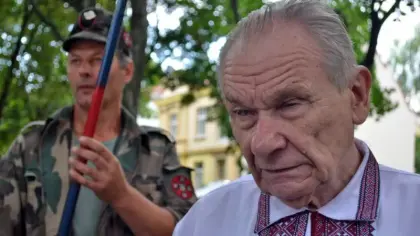I write this memoir about an extraordinary person, not to retell his biography, but rather to pay tribute and express my personal feelings about him from my own interactions, and also to proffer an assessment of what this person meant for Ukrainian society, his people and its history.
The biography of Yuriy Shukhevych, has been written and should be familiar to all Ukrainian patriots. His importance in Ukrainian history cannot be overstated. Yuriy Shukhevych, like his father, was a genuine hero in the purest sense, despite having died from natural causes.
JOIN US ON TELEGRAM
Follow our coverage of the war on the @Kyivpost_official.
Yuriy’s father, Roman Shukhevych, the commander of the Ukrainian Insurgent Army (UPA), was a role model for his contemporaries and a hero for future generations. He will be recognized forever as such, having died in battle with the enemy of his nation in March 1950. The heroic struggle of our people today bears the indelible mark of his spirit.
Yuriy was a child of 11 when he was arrested with his mother and sent to Siberia. Then at 13 he was taken from his mother and essentially interned in an orphanage for children of “enemies of the state.” Subsequently, he was arrested at 15 simply for being the son of his father and sentenced to an initial 10 years when he was merely 16. He became a symbol not only as his father’s son, but as a heroic, undaunted individual in his own right. His whole life was a struggle. He has ended life’s journey, but the struggle under his and his father’s name continues.

Trump Makes 90 Day Foreign Aid Freeze – Ukraine Military Support Supposedly Untouched
Growing up in a Ukrainian nationalist family and similarly ideological organizations, in retrospect one of the most impressionable events on me as a 15-year-old was the anti-Soviet demonstration carried out by the First World Congress of Free Ukrainians in New York in 1967. Among its purposes, the political rally sought to bring the world’s attention to the illicit treatment of a child, Yuriy.
Yuriy’s image was on our banners and his steadfastness was in our hearts and minds. His picture appeared all over the world with an inscription “guilty by birth.” My student anti-Soviet activity was inspired by Yuriy Shukhevych. In total, Yuriy Shukhevych served almost 30 years in Soviet prisons, camps and exile, and continued to inspire us.
With the proclamation of Ukraine’s independence, my trips to Ukraine became frequent. Lviv was always one of the most important destinations for me and my family, since there I could meet Yuriy. He was by then physically disabled and lived as a guardian with two disabled women for whom he cared despite his visual infirmity. I discerned immediately that while he could not see with his eyes, his senses were more acute than that of many with full vision.
Yuriy’s political activity after the proclamation of independence deserves special mention. Yuriy was aware of his role and destiny. He was the quintessential bridge between generations and struggles. He recognized the importance of his own person not as a narcissist, but as a freedom fighter, as the son of his legendary father and that most important nexus.
In fact, he was very modest. He spoke and listened to almost anyone. I had the opportunity and great honor to meet with him many times and to speak in detail on various topics, all related to current affairs and relevant to Ukraine and our people.
Yuriy worked almost until his last breath. Only a few months ago, he had been making arrangements for the funeral of his father’s last military colleague, Daria Husak or Husiak. He was always busy with his work, which invariably had a community or political character. He considered it his duty to his father and to his people.
It is worth mentioning the Shukhevych family, one of the noblest families not only of the city of Lviv, but of all of Ukraine. Aside from Yuriy’s father, Yuriy’s mother, Natalya, at her own peril, was one of the righteous gentiles protecting Jewish lives. When the Soviets returned to Ukraine in 1944 she became a prisoner in the Soviet Gulag. Her brother Yuriy Myroslav Berezynsky had been executed by the Poles in the early 1930s, Roman’s brother Yuriy was murdered by the Bolsheviks as they retreated before the Nazi onslaught of 1941. The Soviets, not unlike the Russians today, murdered their civilian prisoners. Roman’s sister Natalya was a prisoner of Soviet camps as well. Yuriy’s entire close family served as an example to their contemporaries. Much can be said about each of them.
With profound sadness, I express my deepest condolences to Yuriy’s wife Oleksandra, his friends and colleagues. They say that such people are born once every few generations, but the Shukhevych family appears to have outdone itself.
Glory to Ukraine! Glory to its heroes! And eternal memory to Yuriy Shukhevych! Ukrainians will remember him! We will plant a Ukrainian bush, a Kalyna (viburnum) as a symbol of Ukraine on his grave site, so that he can inhale the fragrance of its bloom and taste its fruit. He had raised the failing and bent Red Kalyna often throughout his life. Those who will follow in his footsteps and adhere to his words and example should do likewise.
You can also highlight the text and press Ctrl + Enter










